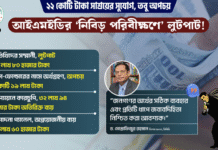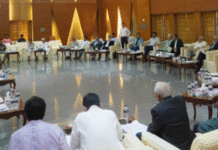Banned chemical brought from India by road, sent abroad by air

A group of chemical traders in Chennai are found to be the kingpins of amphetamine smuggling from India through Dhaka, according to an investigation by the Department of Narcotics Control.
About a year ago, the unscrupulous traders started to use Bangladesh as a smuggling route and ship the banned chemical to several destinations, mostly in Australia and Malaysia, under false declaration and without the knowledge of courier companies.
Amphetamine could be processed into yaba and sold to addicts in the countries where the crazy pills of Myanmar have started to get popular.
Bangladesh banned import of this chemical and its use in the production of cold medicine in February 2017. India also has banned its export, say DNC officials.
The Chennai-based group linked up with some chemical importers at Mitford medicine hub to run the smuggling smoothly for a year, until a package of 12.32kg amphetamine powder was seized from the cargo village area of Hazrat Shahjalal International Airport on September 9.
The contraband was brought to Dhaka by land “every three days” and sent to different countries — each consignment containing 12 to 20 kilogrammes of amphetamine powder.
Over the year, at least 600kg was smuggled out of Bangladesh after its arrival from India. One kg of the powder sold at Tk 1 crore.
The DNC learnt all this while probing a case filed over the seizure in September and after arresting 13 people, including six staffers of a courier service.
So far the investigators found the six were unaware that the courier service was being used for smuggling the contraband as they don’t have the capacity to detect it. All of them already secured bail last month.
Seven other arrestees — Abul Kalam Azad alias Bunty, a chemical trader in the capital’s Mitford Hospital area, Junayed Ibne Siddiqui, and Bunty’s associates Rezaul Haque Bablu, Nazrul Islam, Babul Mazumdar, Md Mazed and Md Bappi — are now in jail.
Junayed, who is from Chandpur, met Chennai-based chemical trader Habib Master in Bahrain in 2018. In the Gulf country, he was running the real-estate business of his father-in-law, who passed away the previous year.

“In 2019, Habib visited Bangladesh and proposed Junayed get involved in the chemical business. Habib also said they had business in the Mitford area in Dhaka and some Indians are involved in it,” said a DNC official, requesting anonymity.
Junayed later met Bunty and Indian nationals Rajkhan and Satish and their operations began.
Bunty was the recipient of the consignments of amphetamine sent through the Benapole border under false declaration while Junayed would courier them to different countries after repackaging at his house. Habib Master and his associates oversaw the entire operations.
The official further said they have so far come to know that this powder used to enter Bangladesh from Kolkata. “We are now trying to collect details whether it is available in Kolkata or it comes from any other state in India.”
Md Mehedi Hasan, assistant director of DNC, told The Daily Star recently that they have got some more names after interrogating the arrestees. “We are now conducting drives to arrest other syndicate members.”
He further said they have also learned about some locations and identities of the people who received these consignments in different countries. “We have sought support from the CID for investigating the foreign links and we may seek Interpol assistance.”
Fazlul Haque Khan, superintendent of DNC, and also the investigating officer of the case, told The Daily Star that they have made some progress in the investigation and are now trying to get details about the smuggling process of the powder from India to Bangladesh.
Kusum Dewan, director (operation) of DNC, told this newspaper that they have some developments regarding the investigation into amphetamine smuggling.
“We have also found some involvement of Indian smugglers behind it and written to the Narcotics Control Bureau of India,” he said.
No response from the Indian side reached the DNC till filing of this report.
SCREENING, DETECTION
“The syndicate used to courier the narcotics after putting it in special packets. As there is no 3D scanner at the airport, it never got detected,” said a high official of DNC.
“Such a consignment is difficult to find out if expert narcotics officials do not check the packages properly or an ultra-modern scanner is not used,” he told this correspondent.
In some cases, some staffers at the airport or courier service might have been involved, he added.
An investigator said that in the absence of modern equipment, courier service offices are also unable to detect it. They have been asked by the department to buy 3D scanners and the Dhaka office of one international courier agency already got one.
Asked about the detection of the consignment in September, another official said, “We suspect it was the poor packaging that might have helped law enforcers detect the amphetamine.”
The Aviation Security Force (Avsec), the agency which seized the amphetamine, refused to comment on this issue and suggested communicating with the director of Shahjalal airport.
Group Captain AHM Touhid-ul Ahsan, director at Shahjalal airport, told The Daily Star on November 15 that they have already beefed up security after the seizures of amphetamine and yaba earlier this year.
“We have installed some more CCTV cameras to cover every inch of the airport and are working to increase trained manpower to work more efficiently,” he said.
Besides, steps have already been taken to buy 11 new X-ray machines for the airport to ensure clear scanning of every package, he said. “The X-ray machines are expected to be included in the airport scanning system within this fiscal year.”
Asked whether these are 3D scanners, he said the details cannot be provided without seeing the papers but this will be modern technology.
Regarding smuggling of amphetamine, Group Captain Touhid said multiple agencies are working at the airport.
“We seize illegal consignments whenever we find any. We even sat with Biman, as they also conduct security scanning, so that we can work jointly with them whenever necessary or they find anything suspicious,” he added.









